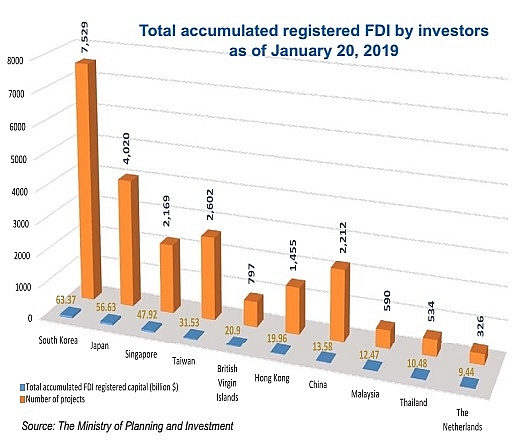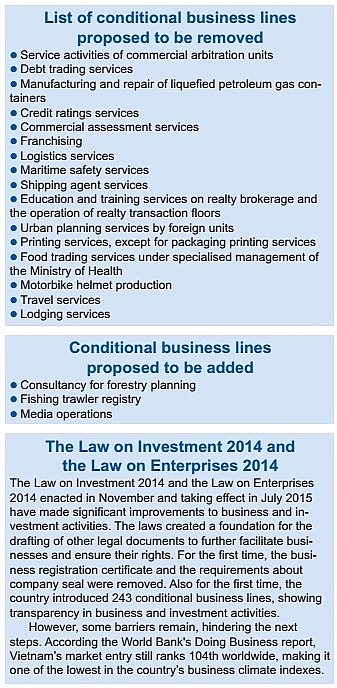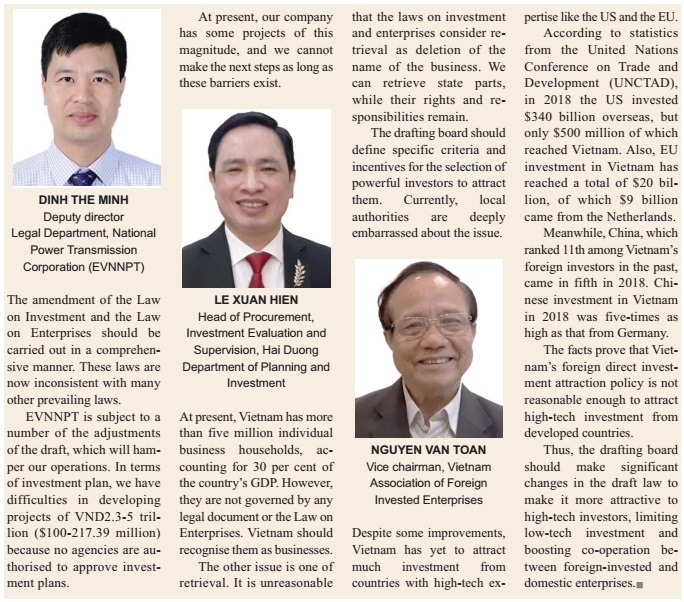Firms respond to legal fine-tuning
 |
Opening the New Year, the Ministry of Planning and Investment (MPI) last week organised a conference to gather comments for the draft law on the revision of the Law on Investment 2014 and the Law on Enterprises 2014, aiming to create momentum for the new development period.
“After more than three years in effect, the laws on investment and enterprises have made improvements to business and investment, thus improving the business climate. However, there remain some shortcomings in the laws that need to be amended to align with the new development period,” said Vu Tien Loc, president of the Vietnam Chamber of Commerce and Industry (VCCI).
The revisions of these two laws are the MPI’s key legislative tasks for 2019, a landmark year for the implementation of the country’s 2016-2020 Socio-economic Development Plan.
 |
Never-before-seen changes
According to the MPI, the revision will focus on completing the list of conditional business lines to create a fair business environment for all enterprises, cutting costs by intensifying administrative reforms, and increasing business autonomy in line with international practices, as well as increasing efficiency in co-operation in business and investment management between central and local agencies.
A highlight amendment to the Law on Investment is cutting 22 conditional business lines (see table), and amending others to facilitate business and investment activities.
This revision is also aimed to perfect basic concepts of investment and business, conditional business lines, and investment conditions for foreign investors, among others. It also proposes to remove several projects which currently have to submit investment plans to the prime minister for approval.
These projects have a total investment capital of at least VND5 trillion ($217.39 million) and include projects the investment and business conditions of which are regulated specifically in international treaties and other relevant legal documents such as foreign-invested projects in shipping, telecommunications services with network infrastructure, media, and 100 per cent foreign-invested sci-tech enterprises.
Furthermore, the principle of non-retroaction for investment conditions will be supplemented for cases where changes of legal documents and policies are incompatible with the investment conditions included in their investment registration certificates. The supplementation aims to help Vietnam fully commit to the World Trade Organization (WTO).
Good news for education investors is the proposal to add tertiary education to the list of sectors receiving investment incentives. Those preferring to expand to and in Vietnam via stake acquisitions are expected to benefit from the removal of the registration procedures in cases where a stake acquisition does not increase foreign ownership at a business.
The draft law also amends 19 articles, as well as removes one article and seven clauses of the Law on Enterprises, which received strong support from businesses. These include the elimination of the requirement that businesses have to register their seal at authorised agencies before using them, and that directors and general directors have to have professional knowledge and experience in the relevant business field and business governance.
Additionally, relevant laws are also revised and supplemented to ensure consistency with the draft. Accordingly, Article 10 of the Law on Real Estate Business is proposed to be amended to remove the requirement for realty firms to have a legal capital of at least VND20 billion ($869,570).
Controversy remains
Despite the significant amendments, there are a number of issues that still concern businesses and law firms which are urging the drafting board to make changes soon.
According to lawyer Nguyen Kim Dung, head of legal and government relations of Apollo Vietnam, the Law on Investment has yet to clarify the term ‘foreign investor.’ In particular, Article 23 does not define how much capital is needed to be called a foreign investor, thus causing difficulties for both investors and agencies granting licenses.
“This lack of clarity causes unhealthy competition among foreign investors, while under the WTO’s commitment, Vietnam has yet to open up to foreign-invested enterprises in preschool education,” Dung said.
 |
Government determination
Regarding the shortcomings in the Law on Enterprises, Le Van Ha, a lawyer at Pathlaw, said that this law does not harmonise the relations between companies and their stakeholders, and between governance units and company members, especially minority shareholders.
Many law firms including Allens, as well as economists such as senior economist Ngo Tri Long, also agreed that it is necessary to clarify the concepts of business and investment, and conditional business lines.
In spite of the shortcomings that will take time to be overcome, the draft reflects the government’s strong determination to further improve the business climate, hoping to create possible breakthroughs for each sector.
Also last week, one day before the MPI’s conference, the amendment of the Law on Investment and the Law on Enterprises was highlighted at the working session of Prime Minister Nguyen Xuan Phuc, designating it as one of the important tasks for the MPI this year.
As planned, the draft is expected to be submitted to the National Assembly for discussion in May and then for approval in November.
What the stars mean:
★ Poor ★ ★ Promising ★★★ Good ★★★★ Very good ★★★★★ Exceptional
 Tag:
Tag:
Related Contents
Latest News
More News
- Hermes joins Long Thanh cargo terminal development (February 04, 2026 | 15:59)
- SCG enhances production and distribution in Vietnam (February 04, 2026 | 08:00)
- UNIVACCO strengthens Asia expansion with Vietnam facility (February 03, 2026 | 08:00)
- Cai Mep Ha Port project wins approval with $1.95bn investment (February 02, 2026 | 16:17)
- Repositioning Vietnam in Asia’s manufacturing race (February 02, 2026 | 16:00)
- Manufacturing growth remains solid in early 2026 (February 02, 2026 | 15:28)
- Navigating venture capital trends across the continent (February 02, 2026 | 14:00)
- Motivations to achieve high growth (February 02, 2026 | 11:00)
- Capacity and regulations among British areas of expertise in IFCs (February 02, 2026 | 09:09)
- Transition underway in German investment across Vietnam (February 02, 2026 | 08:00)






















 Mobile Version
Mobile Version